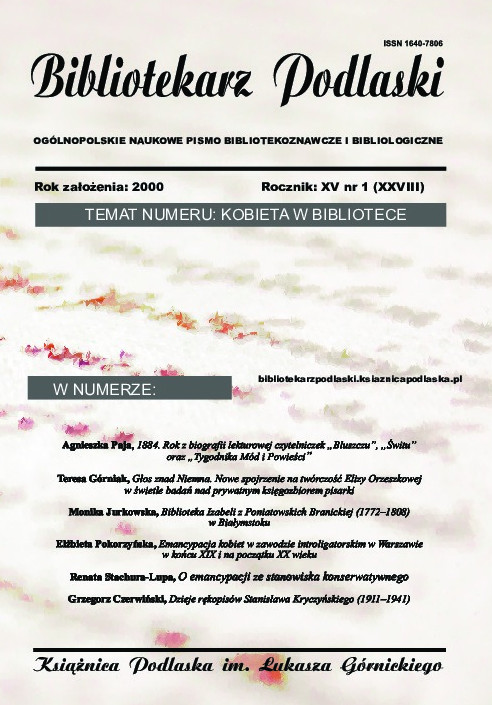Abstract
The author of the article presents a notable representative of the Polish Enlightenment - Izabela Branicka née Poniatowska, who was Polish King Stanisław August Poniatowski’s sister and Great Crown Hemant Jan Klemens Branicki’s wife. What comes into focus in the article is Branicka’s endeavours to create the Palace’s collection in Białystok. The author describes the process of gathering volumes, enumerates types of books included, and identifies their genealogies. Thus, Branicka’s educational project becomes an embodiment of the spirit of the Enlightenment: the Palace’s collection available to readers outside the court, almost like a public library.
References
Arct Z., Wybitni Polacy w służbie książki, Warszawa 1983.
Bartczakowa A., Malinowska I., Pałac Branickich, Warszawa 1974.
Bieńkowska B., Chamerska H., Zarys dziejów książki, Warszawa 1987.
Dobroński A., Szkolnictwo w Białymstoku do 1914r., w: Studia i materiały do dziejów miasta Białegostoku, pod red. H. Majeckiego, t. 4, Białystok 1985.
Dunin Kozicki Z., Białystok w XVIII wieku, „Kwartalnik Litewski” 1910, z. 3.
Glinka J., Źródła archiwalne do dziejów mecenatu Jana Klemensa Branickiego, Sprawozdania Towarzystwa Naukowego Warszawskiego, Wydział II, R. 51, 1948, Warszawa 1950.
Historia bibliotek, http://www.biblios.info/wiedza/historia-bibliotek/ (dostęp dn. 15.02.2014 r.).
Jazdon A., Wielkopolskie serie wydawnicze do 1945 r., Poznań 1997.
Kania A., Bryzek M., Biblioteka Stanisława Augusta Poniatowskiego, http://www.wsp.krakow.pl/whk/biblioteki/poniatow.html (dostęp dn. 23.02.2014).
Kosmanowa B., Książki i jej czytelnicy w dawnej Polsce, Warszawa 1981.
Krajewska M., Biblioteka Izabeli i Jana Klemensa Branickich w Białymstoku, „Studia Teologiczne” 1989, nr 7.
Księżna Anna z Sapiehów Jabłonowska (1728-1800) w 200. Rocznicę zgonu, pod red. A. Wołka, Z. J. Wójcika, Siemiatycze 2001.
Lechowski A., A. Cz. Dobroński, Izabela Branicka w 200-lecie śmierci, Białystok2008.
Libera Z., Życie literackie w Warszawie w czasach Stanisława Augusta, Warszawa 1971.
Mecenat artystyczny Branickich, pod red. M. Olesiewicza i B. M. Puchalskiej-Dąbrowskiej, Białystok 2004.
Mościcki H., Białystok - zarys historyczny, Białystok 1933.
Oleńska A., Jan Klemens Branicki. Sarmata nowoczesny. Kreowanie wizerunku poprzez sztukę, Warszawa 2011.
Potocka A., Pamiętniki, z przedm. Piotra Chmielowskiego, Warszawa 1893.
Problematyka lekarska na łamach warszawskiego czasopisma popularnonaukowego „PolakPatriota” 1785,„Biuletyn Głównej Biblioteki Lekarskiej” 1993, nr 348.
Smoleński W. Przyczyny upadku projektu Kodeksu Zamoyskiego w : Pisma historyczne. Tom I Kraków 1901.
Sokół Z., Dzieje bibliotek w Białymstoku (odXVIII do1939), Białystok 1999.
Strzelecki S., Czy Białystok pamięta o I. Branickej?, „Bibliotekarz Podlaski” 2007/8, nr 15/16.
Sztachelska A., Białystok w korespondencji Branickich, Studia i materiały do dziejów miasta Białegostoku, pod red. J. Joki, t. 3, Białystok 1972.
Sztachelska-Kokoczka A., Magnackie dobra Jana Klemensa Branickiego, Białystok 2006.
W stronę Francji... Z problemów literatury i kultury polskiego Oświecenia, pod red. E. Z. Wichrowskiej, Warszawa 2007.
Żbikowski P., Horyzonty polskiego Oświcenia. Wykłady z epoki 1740-1830, oprac. J. Kowal, Kraków 2010.
Articles published in the “gold open access” mode on the basis of a non-exclusive license agreement between the publisher and the author. Permitted use:
- the publication may be read and stored on any device,
- the publication may be cited (with obligatory reference to the author, the title of the text, as well as the full title, bibliographic address of the issue and page of the journal)
The editorial team of “Bibliotekarz Podlaski” implements an open access policy by publishing materials in the form of the so-called Gold Open Access. From volume 42 (issue 1/2019), the journal is available under the Creative Commons license (Attribution – ShareAlike: CC BY-SA).
The key declarations of the Open Access and Open Science movement, which we fully support, are available on the CEON Open Science website.
COPYRIGHT:
The editorial team of “Bibliotekarz Podlaski” implements an open access policy by publishing materials in the form of the so-called Gold Open Access. The journal is available under the Creative Commons license – Attribution – ShareAlike 4.0: International: CC BY-SA 4.0).
The key declarations of the Open Access and Open Science movement, which we fully support, are available on the CEON Open Science website.
“Bibliotekarz Podlaski” allows its readers to read, download, copy, distribute, print, search and link to the full content of articles. We enable full, immediate, unlimited (both in a territorial, temporal and technical sense) open access to all published content, in accordance with the principle that freely available research increases and accelerates the global development of science and the exchange of knowledge.
The editorial team of “Bibliotekarz Podlaski” encourages authors to place articles published in the journal in open repositories (after the review or the final version of the publisher), provided that a link to the journal’s website is provided.
The journal does not charge the authors any fees for accepting and publishing their texts.

